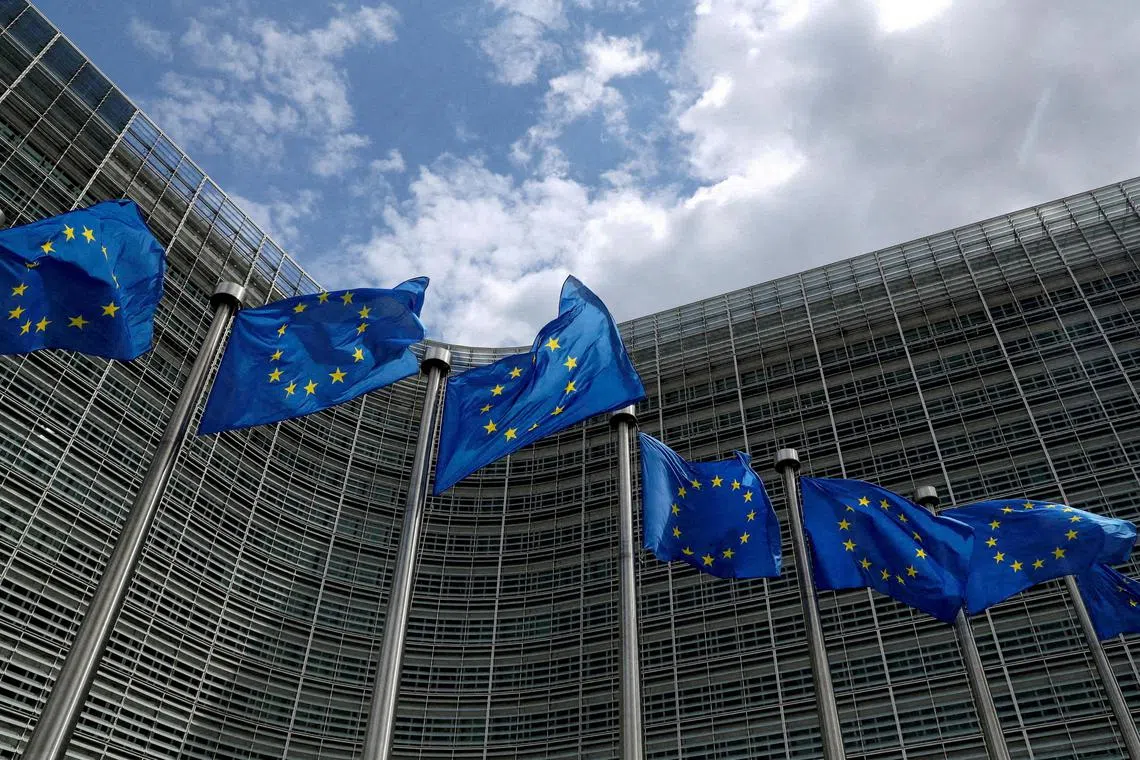Singapore concludes bilateral digital trade deal with European Union
Sign up now: Get ST's newsletters delivered to your inbox

The EU-Singapore Digital Trade Agreement is the first digital trade deal between the EU and an Asean country.
PHOTO: REUTERS
Follow topic:
SINGAPORE - The European Union and Singapore concluded their negotiations on a digital trade agreement in Belgium’s capital Brussels on July 25.
The EU-Singapore Digital Trade Agreement (EUSDTA) will provide clarity and legal certainty for companies and consumers on the rules for digital trade between Singapore and the EU, and strengthen digital connectivity and interoperability between the two markets, the Ministry of Trade and Industry (MTI) said in a statement.
Talks to secure a digital pact with the EU, which is one of Singapore’s top trading partners for both goods and services, began in July 2023
Digital trade refers to commerce enabled by electronic means, using devices such as mobile phones and computers, and covers trade in both goods and services across all sectors of the economy.
A joint statement on the conclusion of negotiations said the EU and Singapore will now proceed with their domestic approval processes to work towards the formal signing and conclusion of the agreement.
No date was announced for when the deal will come into force.
MTI said the agreement will enable open and secure data flows, facilitate end-to-end digital trade, and establish trusted and secure digital systems for businesses and consumers. It will also remove and prevent the emergence of unjustified barriers to digital trade.
The EUSDTA will put in place legally binding rules to prohibit data localisation requirements and uphold the protection of personal data. It will allow for more seamless and cost-efficient transactions and protect against forced transfers of technology and intellectual property.
Data localisation laws require data about a nation’s citizens or residents to be collected, processed, and/or stored inside the country.
The agreement will also protect consumers from unfair practices and spam, and promote cooperation, including enhancing opportunities for small and medium-sized enterprises to participate in the digital economy.
Minister for Sustainability and the Environment Grace Fu, who is also Minister-in-charge of Trade Relations, said: “The EUSDTA underscores Singapore and the EU’s shared commitment to ensuring that our companies and people have legal certainty and confidence when transacting in the digital economy, amidst a rapidly evolving regulatory landscape.”
The EUSDTA is the first digital trade deal between the EU and an Asean country, and hence will help advance greater region-to-region digital connectivity, she noted.
The EU is Singapore’s fourth-largest goods trading partner. In 2023, bilateral trade in goods grew to over $105 billion, representing 8.7 per cent of Singapore’s total goods trade.
The EU is also Singapore’s second-largest services trading partner, with bilateral trade in services reaching over $98 billion in 2022. Investment relations are also robust, with the EU being Singapore’s second-largest foreign investor and second-largest overseas investment destination.
The EU and Singapore already have a free trade agreement, the EUSFTA
Singapore has inked four digital trade pacts in the past few years – the Digital Economy Partnership Agreement with Chile and New Zealand Singapore-Australia Digital Economy Agreement United Kingdom-Singapore Digital Economy Agreement Korea-Singapore Digital Partnership Agreement
Digital trade agreements are Singapore’s way of building on its extensive network of digital cooperation initiatives. They complement the nation’s role at the World Trade Organisation as co-convener, together with Australia and Japan, of the Joint Statement Initiative on e-commerce.
Such pacts have become imperative as digitalisation and technological disruptions transform consumer behaviour and business models, while at the same time creating new opportunities.
In conjunction with the announcement on the EUSDTA, Ms Fu and European Commission Executive Vice-President for an Economy that Works for People and Commissioner for Trade Valdis Dombrovskis co-chaired the second trade committee meeting under the EUSFTA.
Among other issues, the leaders discussed ways to strengthen collaboration in forward-looking trade areas including the green economy, exchanged views on regional and global economic developments including at the World Trade Organisation, and agreed to continue working together on shared priorities to strengthen trade and investment links.


